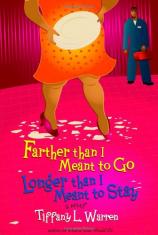Reading Group Guide
Discussion Questions
Farther Than I Meant To Go, Longer Than I Meant To Stay

1. Charmayne is inclined to deny the relevance of her spiritual health to her psycho-emotional condition. In your experience, what is the connection between our spirit self (1 Corinthians 2:6–16) and our physical or mental health?
2. Does Charmayne strike you as being selective or picky, possessing high standards or being impossible to please? Why? How do you make decisions about an eligible dating or marriage partner?
3. How does meeting Charmayne’s mother shed light on Charmayne’s character, personality, and hang-ups about her body image --- among other things? How do the voices of your childhood echo in your present sense of self ? How does your faith help you respond to the negative messages?
4. Reread 2 Samuel 21 in a modern Bible translation.What do you think of Rizpah? In what ways can you identify with her? What do you think it was about her that drew a response from King David?
5. In your assessment, what’s to like about Travis? What’s to be concerned about? How you discern whether the voice in your head is God --- or your own insecurities?
6. How would you react to an announcement like Travis’s (that Charmayne was to be his wife)? What faith would you put in a man’s conviction that God had “given” you to him? What would hold you back --- fear, lack of faith, low self-esteem . . . or common sense and the Holy Spirit?
7. What is your usual means for discerning God’s will in your life? Does your method of discernment differ for decisions that are more important --- such as career, marriage, children, relocation, and the like? Why or why not?
8. Read Genesis 29 for yourself.With whom do you more readily identify --- Leah or Rachel? Why?
9. What qualities do you prioritize in a man? Which characteristics disqualify a brother from your consideration? What role does scripture or prayer have in your selection process?
10. How is Charmayne’s recollection of her grandmother’s bruised-peach pie comparable to a parable of Jesus? What spiritual or practical insight do you glean from the story?
11. “Just give me something to hold on to,” Charmayne tells Travis. What do you hold on to in your life --- especially in your relationships? How does your hold on God affect your grasp on other people or things? (See Matthew 6:33; Philippians 2:4–8, and 3:9–14.)
12. As Christians, what responsibility do you think we have to take a chance on someone with a past --- be it financially, relationally, or otherwise? If God is a God of second chances, if we are called to forgive and restore, how do we balance that calling with guarding against wolves in sheep’s clothing? (See Psalm 86:5; Luke 6:37, and 17:3–4; 2 Corinthians 2:5–11.)
13. What’s your philosophy on a long engagement, and why? What are the pros and cons? (See Proverbs 14:29b; 1 Corinthians 7:9.)
14. What is the value of premarital counseling? (See Proverbs 11:14, 12:15, 15:22, and 19:20.)
15. Scripture makes clear that God may speak through dreams (see Genesis 37; 1 Kings 3; Daniel 2; Joel 2:28). Have you ever perceived God speaking to you in such a way? How can you responsibly interpret a dream with spiritual meaning? (Again, look to Proverbs 11:14, 15:22, and 24:6.)
16. What experience have you had in the reciprocal benefits of ministry --- gaining as much as you give, learning as much as you teach? (Consider Luke 6:38; 2 Corinthians 9:6.)
17. Did the pastor’s revelation about finances being the prime cause of divorce surprise you? Why or why not? How do (or will) you handle money in your marriage? Do you feel strongly about finding a sugar daddy --- or being a sugar mama? Do you think the Bible dictates roles or responsibilities in family finances? If so, what scriptures guide you, and why?
18. “His biggest gift to me had been marrying me.”What is your reaction to Charmayne’s thought about Travis? Do you identify with that feeling? Why or why not? In what sense is such a perspective healthy --- or unhealthy?
19. Consider the biblical story of the Israelites’ forty-year wandering in the wilderness. When have you taken an unnecessary detour in your life --- walking farther than God intended you to go? How did the Lord bring you back around --- and what good did He redeem from it (Romans 8:28)?
20. Consider how Charmayne reacted to the shocking truth about Travis, their marriage, and her job situation.What do you do when the world seems to crumble around you? Where do you turn --- and to whom? (Psalm 121 offers a good starting place!)
21. “For some reason I was relieved by the fact that she was a black woman.”Why do we feel safer talking to someone who (even on the surface) seems most like us?
22. Tell someone in your group about yourself --- not just the situational statistics (age, race, marital status, occupation, family) but the real you. Consider it a glimpse of the future promised in 1 Corinthians 13:12!
23. Reread Matthew 5:43–45 and consider it in the context of a personal struggle with forgiving an enemy. What would it look like for you to put that verse into action? What keeps you from doing so?
24. Throughout this novel, Charmayne’s self of sense is tied inextricably with issues of her weight. (Even in her healing process, she perceives that Jesus boosts her selfconfidence by helping her lose weight.) Why do you think women are so hung up on appearances, biblical exhortations notwithstanding? Read again scriptures such as Proverbs 31 (which says nothing about physical appearance), 1 Samuel 16:7, and 1 Timothy 2:9–10 as affirmations.
Farther Than I Meant To Go, Longer Than I Meant To Stay
- Publication Date: October 16, 2006
- Paperback: 321 pages
- Publisher: Warner Books
- ISBN-10: 0446693537
- ISBN-13: 9780446693530







